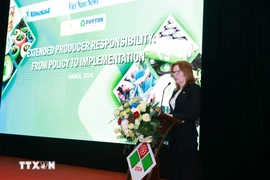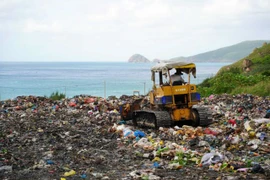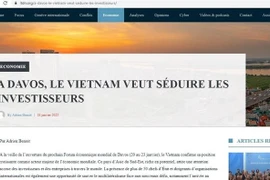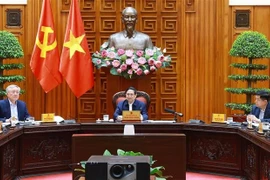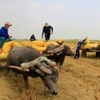Hanoi (VNS/VNA) - The implementation of Extended Producer and Importer Responsibility (EPR) regulations is a crucial step in enhancing corporate accountability in waste management and promoting Vietnam’s shift to a circular economy.
Deputy Director of the Department of Environment under the Ministry of Agriculture and Environment Ho Kien Trung made the statement at a training workshop on implementing EPR held in Hanoi on March 25.
“This move supports the country’s commitment to sustainable development, green growth and emissions reductions, aligning with its international obligations,” he said.
According to the department, before the introduction of these regulations, the majority of used packaging was irresponsibly discarded into the environment. To address this, by March 31, all manufacturers and importers must register their recycling plans, declare financial contributions to the Vietnam Environmental Protection Fund and report their waste management activities from last year. The registration process will be done online to ensure efficiency and transparency.
The legal framework now mandates that businesses fulfil their extended responsibility by either organising recycling operations or financially supporting waste treatment, he added.
“The implementation of EPR regulations will be phased. Manufacturers and importers of tires, lubricants, batteries, accumulators and certain types of packaging must have already begun their recycling efforts. The EPR for electrical and electronic products started in January, and will begin for transport vehicles in 2027.”
The regulations also apply to producers and importers of disposable batteries, diapers, chewing gum, cigarettes, synthetic plastic products and pesticide packaging, who must take responsibility for waste collection and treatment.
The Department of Environment is committed to supporting businesses in the process of implementing EPR. It expects close cooperation from the business community, industry associations and relevant agencies to build an effective and sustainable EPR system.
“Before the EPR regulations, most packaging waste was discarded irresponsibly. Under the new system, businesses must either organise recycling operations or contribute financially to the Environmental Protection Fund,” Nguyen Van Phan from the EPR Office said.
These regulations heavily impact packaging manufacturers and importers, especially those in sectors like food, cosmetics and pharmaceuticals, are heavily impacted by these regulations.
“Enterprises must declare their financial contributions to waste treatment on the National EPR Information System, based on the products and packaging they produced or imported in the previous year,” he added.
Addressing business concerns
During the workshop, businesses raised concerns regarding the offsetting of contributions for waste treatment and reporting requirements. In response, Do Xuan Thuan from the EPR Office said: “Per Decree 05, financial contributions for waste treatment in 2024 will be used in 2025. No business has yet made a contribution for recycling.”
He also clarified that recycling responsibilities would be calculated based on the volume of products. “Businesses need to submit their declarations before the March 31 deadline, and the EPR Office will assist with any issues that arise,” he told attendees.
Dao Nguyen Khanh of the Siam City Cement Vietnam Co., Ltd. suggested that the Ministry of Agriculture and Environment consider integrating cement co-recycling technology into the EPR framework. This technology, which uses waste as fuel in cement production, has been successfully adopted in other countries.
Le Ngoc Giang from the EPR Office acknowledged the proposal, but noted that Decree 08 currently lacks provisions for this. However, he added that the ministry is amending the EPR policy and will consider the inclusion of such technologies if businesses provide sufficient data and impact assessments.
As for the involvement of the Ministry of Construction in the EPR assessment council, Giang said that the Ministry of Agriculture and Environment would explore expanding participation, especially concerning emissions reduction and waste treatment in the construction sector.
He said that businesses must adhere to their declared recycling plans. “If a company meets its recycling target in 2024, this will be recognised in 2025. Moving forward, companies must register their recycling plans, valid until March 2026,” he said.
The system will allow businesses to track their progress and ensure they meet recycling targets accurately. "EPR policy requires manufacturers to manage products after they become waste, including collection, classification, treatment, reuse, recovery and disposal," he added./.
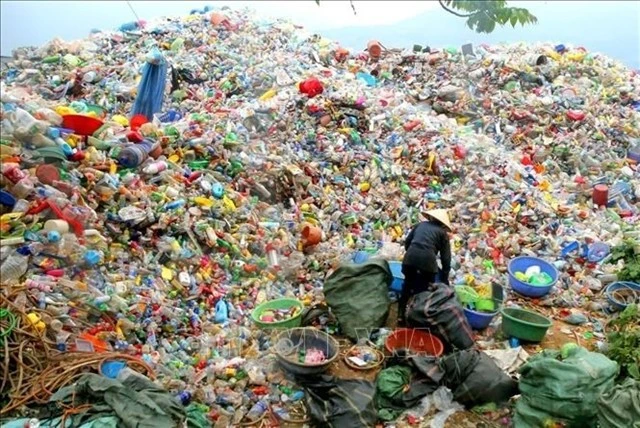
See more

Vietnam Airlines launches direct service to world’s largest airport in China
Vietnam Airlines plans to open and resume 15 international flight routes in 2025, continuing to expand its flight network to countries such as Italy, Denmark, the Middle East, Russia, and China
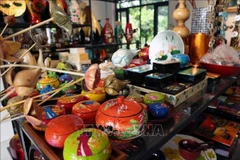
Hanoi boosts economy through craft village development
Hanoi is implementing various initiatives to develop local craft villages.
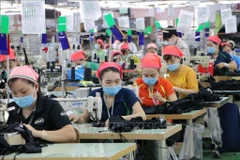
Vietnam’s garment-textile industry stitching a greener, smarter future
Supported by 17 next-generation free trade agreements (FTAs) already in effect, the industry is poised for further growth, targeting 48 billion USD in export revenue this year.
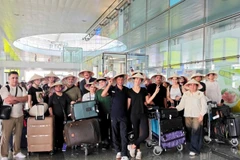
First charter flight from Iran lands in Hanoi, boosting tourism ties
Charter flights offer a swift, direct connection between the two nations, unlocking potential for broader cooperation in aviation, trade, culture, and education.

PM urges completion of North-South expressways by year-end
Chairing a meeting between permanent Government members and inspection teams for expressways nationwide in Hanoi on March 29, PM Chinh, who is also head of the State Steering Committee for Key Transport Projects, stressed that achieving a growth rate of at least 8% in 2025 and double-digit growth thereafter hinges on public investment.
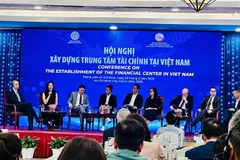
Vietnam develops roadmap for establishing international financial centre
Speaking at a conference on creating a financial centre in Vietnam on March 28, Minister of Finance Nguyen Van Thang said Vietnam is “on the brink of a golden opportunity” to establish itself as a key player in the global financial arena.
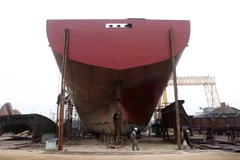
Ample room to float Vietnam’s shipbuilding industry
As domestic and global demand for new ships continues to rise, Vietnam's shipbuilding industry has significant potential for growth.
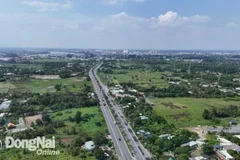
Dong Nai approves planning for 3 billion USD urban area project
Located along the Dong Nai River, the 293-hectare Hiep Hoa Urban Area project in Bien Hoa city, Dong Nai province will feature a new urban complex with a low population density, modern infrastructure, and a harmony with nature. The development will also focus on sustainable tourism, offering a mix of residential areas, commercial-service housing for tourism, ecological villas, and public services.
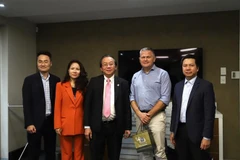
Vietnam, South Africa eye stronger air logistics links
While South Africa’s aviation logistics sector plays a crucial role in its economy, Vietnam still has significant potential for development, particularly in air freight.
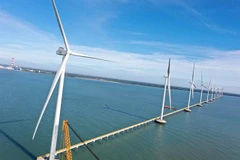
Tra Vinh approves investment policy for five more wind power projects
The Tra Vinh provincial People’s Committee has given the green light to the investment policy for five wind power projects, for an investment total of over 13.8 trillion VND.
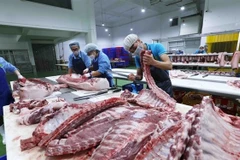
Deputy PM requests investigation into record high pork prices
Pork prices reach as high as 80,000 VND (3.14 USD) per kilogramme in some localities, which is the highest level in the last five years.
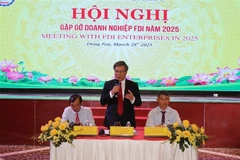
Dong Nai holds dialogue with FDI enterprises to ease difficulties
At the event, businesses raised concerns related to value-added tax refunds, increased land rental costs, reduced LNG supply, labour shortages, the issuance of construction ownership certificates, and environmental hygiene and traffic safety on roads within industrial zones.
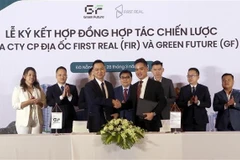
Green Future powers green tourism in Da Nang with 1,000 electric vehicle lease
Under the deal, GF will initially deliver 300 VinFast EVs to First Real to jointly advance sustainable tourism, providing visitors with eco-friendly and convenient transportation options. The remainder will be handed over within this year.
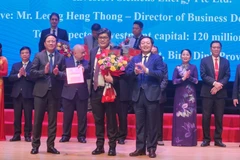
Binh Dinh approves 62 investment projects worth over 9 billion USD
With a sound investment climate, Binh Dinh has become an attractive destination for investors, positioning itself as one of the most dynamic economic hubs in the country, and a leading development province in the region.
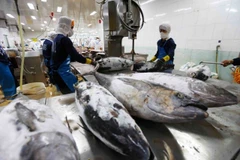
Tuna exports hit record high but face major regulatory barriers
Statistics from Vietnam Customs show that the value of tuna exports in February reached nearly 73 million USD, which marks a 41% increase on-year and the highest level for the same period over the past five years.

Viettel’s new member aims to exploit customer service market
Viettel Customer Service is a technology company focused on customer services, offering end-to-end solutions including consulting, design, software development, and human resources.
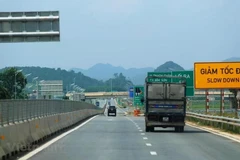
Over 6.2 billion USD needed for expanding North-South expressway
The Ministry of Construction has proposed expanding the 1,144-km eastern wing of North-South expressway from Hanoi to Ho Chi Minh City from four to six lanes, at an estimated cost of 152.1 trillion VND (around 6.2 billion USD).
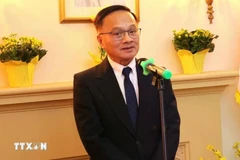
Vietnam-Canada Business Association expands operation
The establishment of the Eastern Chapter not only marks a significant step in the Vietnam-Canada Business Association's growth but also addresses the rising demand for networking and collaboration among Vietnamese and Canadian entrepreneurs in the region.
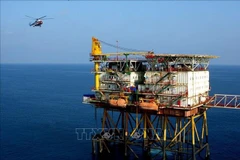
📝OP-ED: Apparatus streamlining and SOEs’ leading role
Currently, in Vietnam, there are more than 670 SOEs, with about two-thirds wholly owned by the state. In the remaining ones, the state holds more than 50% of the charter capital.
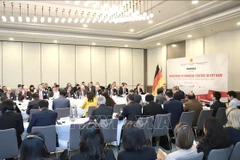
Int’l financial centre ensures Vietnam’s sustainable financial growth: Experts
Financial experts expressed their willingness to share knowledge, expertise, and support Vietnam’s access to vital capital, while as assisting Vietnam in training and recruitment of highly skilled financial professionals to ensure the swift and effective development of the financial centres. Additionally, they committed to connecting Vietnamese businesses with German and international investors.
